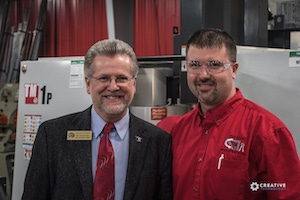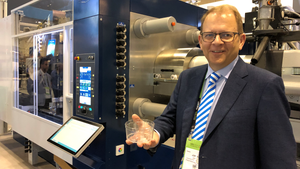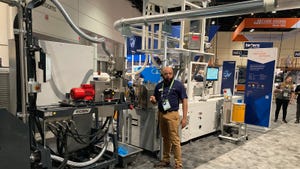Could the decline in college enrollment signal a trade-school resurgence?
April 11, 2016

Trade schools just might be on the cusp of a resurgence as college enrollment declines. A Bloomberg article on Oct. 4, 2015, “Decline of college degree seen in falling enrollment,” pointed out that college enrollment has fallen for three consecutive years after climbing for many decades.
The reason cited for this drop “is simple economics,” said Bloomberg. “College costs have risen dramatically, with much of the price tag going to pay for the salaries of administrators. At state schools, the rise in net costs—tuition minus financial aid—has been especially steep. But the actual out-of-pocket cost to students has been much higher than the rise in tuition.”
Additionally, “more people are questioning the benefits of college,” said Bloomberg. This is especially true among students “on the margin” for whom a college degree has a low value relative to the cost of tuition and being out of the labor market for an extended period of time.
That brings us to the manufacturing sector, which is hungering for employees skilled in various trades. While some politicians, such as Democratic presidential candidate Bernie Sanders, are promising “free college tuition” for everyone, it’s already evident that the “college for everyone” drive isn’t panning out so well. High costs and low job/salary opportunities are causing both parents and students to rethink their career choices. Let’s face it, college isn’t for everyone.
When I was working in the plastics industry, one of our moldmakers was an engineering student at Arizona State University, where I was also a part-time student. This moldmaker had taken some apprenticeship training and learned machining and then moldmaking while attending ASU. He made a very good living, upwards of $40,000 (in 1980s wages) at the mold company, which means that when he graduated he not only had a trade but an engineering degree, to boot!
We’re seeing more and more movement in the plastics/mold manufacturing industries toward apprenticeship programs; companies are feeling the pressure to attract and train the next generation of students. Trade schools are coming back in many areas of the country, and even high schools are starting to take notice. However, there are some caveats for these schools.
Keith Campbell, author of On The Edge, an online blog, recently wrote about how schools ignore the law of supply and demand. “Why,” Campbell asks, “do we allow high schools and universities to ignore supply and demand when admitting students into educational programs and providing financial aid?” Campbell goes on to question why, when visiting “high school career and technology centers, you will find beauty shop classrooms overflowing with young women, machine shop classrooms nearly empty, and probably no classroom at all for industrial maintenance technology?”
Campbell aptly notes that high schools, colleges and technical/trade schools need to look at where the skilled jobs demand is greatest and implement programs that will best meet industry needs. While many graduates will have a difficult time finding work because they chose a career path where there is more supply than demand of employees, “manufacturing companies are crying for workers to fill the shortfall of two million skilled workers that are projected to be needed over the next 10 years for much higher paying jobs.” This same phenomenon applies to universities, which often graduate hundreds of students with degrees in areas of low demand, and very few in areas of high demand.
I would add that there are several reasons for this. While I’ve seen some very successful technical and skilled-trades programs in community colleges and trade schools, they are largely successful because they hire teachers who are closely linked to manufacturing. They also have tremendous support from the manufacturing community, including suppliers that provide the very expensive equipment the students need to get proper training and local manufacturing companies that offer internships and on-the-job training.
When Wittmann Battenfeld donated an EcoPower injection molding machine work cell to the UMass Lowell Plastics Engineering center, students really benefited from that. For example, Mitchell Corneau of Providence, RI, has decided to pursue a master’s degree at UMass Lowell after he graduates with a B.S. in plastics engineering in May. His interest in plastics came from working in his uncle’s company, Plastixs in Charlton, MA, who encouraged him to look at the UMass Lowell program.
“It’s the only school in the country that offers post-graduate degrees in plastics engineering,” he said. “They run an extremely challenging program, but we know what we learn every day applies directly to the real world.” Mitchell recently returned from a three-month internship at GE Appliance Park in Louisville, KY, and has already learned how to operate the new Wittmann Battenfeld machine.
|
Craig Cegielski (right) of Cardinal Manufacturing with state Representative Wayne Petryk. |
Eleva-Strum High School in Strum, WI, has a manufacturing program that goes above and beyond most high school or even community college and trade school programs. The Cardinal Manufacturing program was designed as a local way to address the skills gap in advanced manufacturing and to engage students in meaningful education by exposing them to the potential of manufacturing-related careers, said the school’s information. While it provides them with technical skills, the program also instills the “soft skills and professionalism” that employers want.
Taught by Craig Cegielski, who recently won the 2015-2016 Monsanto Fund Rural Teacher of the Year award given by the National Rural Education Association, Cardinal Manufacturing is a student-run manufacturing enterprise. It has real customers, real deadlines, real quality issues and ultimately earns real money through its welding, machining, woodworking, automotive and CAD classes. Students take classes in the ninth and 10th grades and then can apply for positions in Cardinal Manufacturing in the 11th and 12th grades. Profits from the enterprise are divided among the students at the end of the school year. Cardinal Manufacturing is supported by businesses, organizations and individuals.
While a four-year college or university offers many benefits to students, the price tag and difficult job market for many of the degrees offered are giving people pause. And it might also be giving people a reason to really explore where the jobs are, such as manufacturing, and look for schools that offer technical and mechanical skills leading to good-paying careers.
Campbell concludes that “we need to stop turning out students that have too-high expectations and too-little preparation for the real jobs and careers that are available. To those who say that kids don’t know what they want to do and college is a rite of passage, I say, work or the military will mature them faster than college, and they will figure out what they want to do. Then college, if necessary, to achieve their goals will deliver a real return on investment.” (www.ontheedgeblog.com/article/do-our-schools-know-about-law-supply-and-demand)
About the Author(s)
You May Also Like




